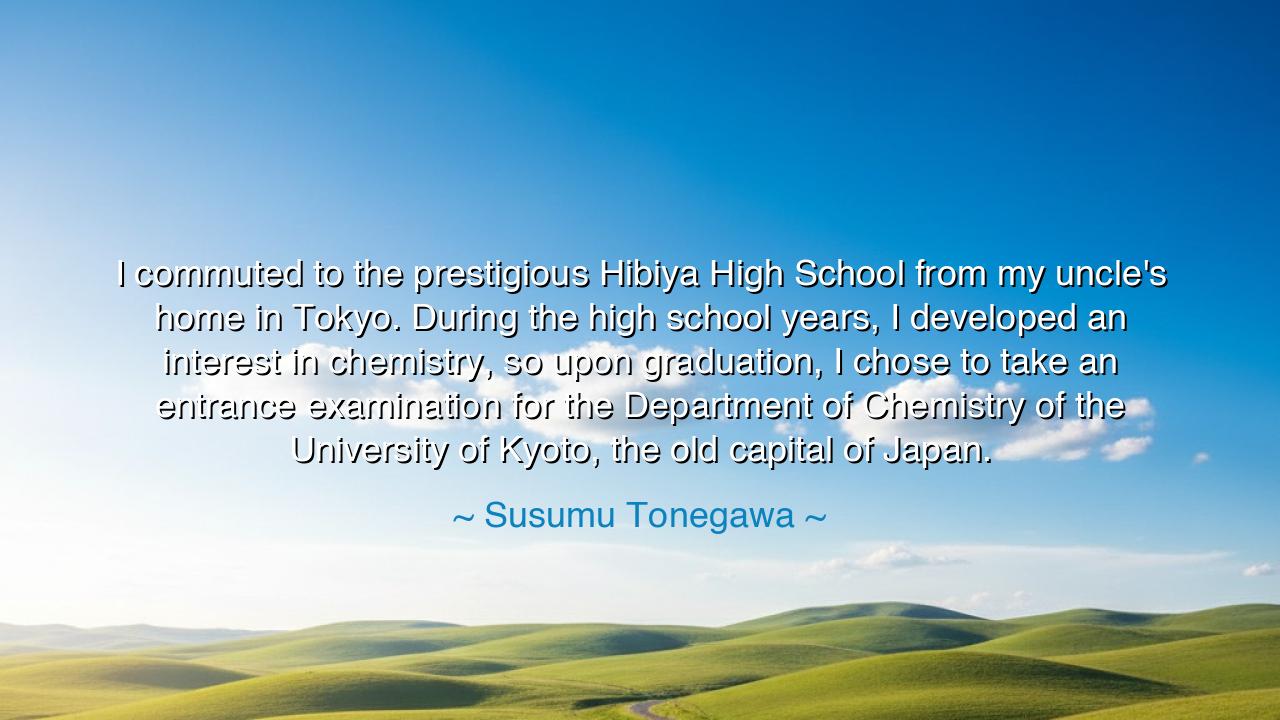
I commuted to the prestigious Hibiya High School from my uncle's
I commuted to the prestigious Hibiya High School from my uncle's home in Tokyo. During the high school years, I developed an interest in chemistry, so upon graduation, I chose to take an entrance examination for the Department of Chemistry of the University of Kyoto, the old capital of Japan.






Hear now the calm and reflective words of Susumu Tonegawa, a seeker of knowledge whose mind would one day unravel the mysteries of life itself: “I commuted to the prestigious Hibiya High School from my uncle’s home in Tokyo. During the high school years, I developed an interest in chemistry, so upon graduation, I chose to take an entrance examination for the Department of Chemistry of the University of Kyoto, the old capital of Japan.” Though modest in tone, these words carry the quiet strength of destiny unfolding — the story of a young man’s awakening, a mind shaped not by chance but by curiosity, discipline, and the slow, sacred growth of purpose.
The meaning of this quote lies in the still yet powerful rhythm of discovery — the way in which passion arises from humble beginnings. Tonegawa, who would go on to win the Nobel Prize in Physiology or Medicine, speaks not of triumph or fame, but of the first stirrings of interest, the simple spark that became the flame of a lifetime. His reflection reminds us that greatness seldom begins in grandeur. It begins in small, quiet choices: a student walking each morning to school, a young mind gazing at the unseen beauty of chemistry, a single decision at graduation that sets the course for decades of achievement. Every mountain, no matter how high, begins with the first step upon the path.
The origin of these words lies in the cultural and historical context of post-war Japan, a nation rebuilding itself from ashes through education, diligence, and discipline. Hibiya High School in Tokyo was one of the country’s most renowned institutions — a place where the brightest young minds were tempered by rigor and responsibility. Tonegawa’s daily commute from his uncle’s home to that school was more than a journey of distance; it was a pilgrimage of learning. In that era, every student carried not only books but the weight of their family’s hopes and their nation’s rebirth. His decision to study at Kyoto University, a place rich with history and tradition, reflects the fusion of Japan’s ancient spirit and its modern pursuit of scientific excellence.
Consider, O listener, the story of another who walked a similar road: Isaac Newton, who during his youth at Trinity College in Cambridge found himself driven inward by curiosity about the natural world. In the solitude of study, as plague swept the land, Newton began asking the simplest yet deepest questions — why does an apple fall, why do the planets move as they do? Like Tonegawa, Newton’s journey began not with acclaim but with a question, and with the courage to follow it wherever it led. From quiet beginnings arise discoveries that change the world. The young student who once sat beneath the apple tree became the voice of universal law; the young man from Tokyo, fascinated by the invisible architecture of matter, became the discoverer of the genetic mechanism of antibody diversity, illuminating the very language by which the body defends life itself.
In Tonegawa’s words, there is also reverence for the discipline of education — for the structure and patience that forge the scholar’s soul. The act of choosing, of taking an entrance examination, is not simply academic — it is a test of will. To pursue a path of knowledge requires not only intellect, but endurance. In the old capital of Kyoto, surrounded by temples and gardens steeped in the wisdom of centuries, he studied chemistry — the science of transformation. How fitting that from this ancient place, he would learn that transformation is the essence of both matter and mind. His path teaches us that intellect and spirit are not enemies but allies — that the pursuit of science, when done with devotion, is itself a form of worship, a way of touching the divine order within creation.
The lesson of this quote reaches beyond science, beyond the individual, to the heart of all human striving. We are reminded that destiny reveals itself not in a moment of revelation, but in the patient unfolding of choice and effort. Each day, each decision, each step — these are the threads from which the tapestry of greatness is woven. Tonegawa’s journey tells us that the true measure of success is not the title or the award, but the integrity of the path itself. To follow your curiosity with humility and diligence is to live in harmony with your purpose.
So take these words to heart, O student of life: do not despise the small beginnings. Whether you walk through the crowded streets of Tokyo, or sit in a quiet room with your books, know that the seeds of greatness lie hidden within every day of learning. Cultivate your interest, nurture your discipline, and when the time comes, follow your passion as Tonegawa did — not for glory, but for truth. For the one who walks faithfully in the direction of curiosity may one day find, as he did, that the search for knowledge is the highest form of gratitude to life itself. And thus, through your own pursuit of wisdom, you too may leave a light for those who come after, as he did, from a humble journey that began with a simple choice — and a heart set upon discovery.






AAdministratorAdministrator
Welcome, honored guests. Please leave a comment, we will respond soon